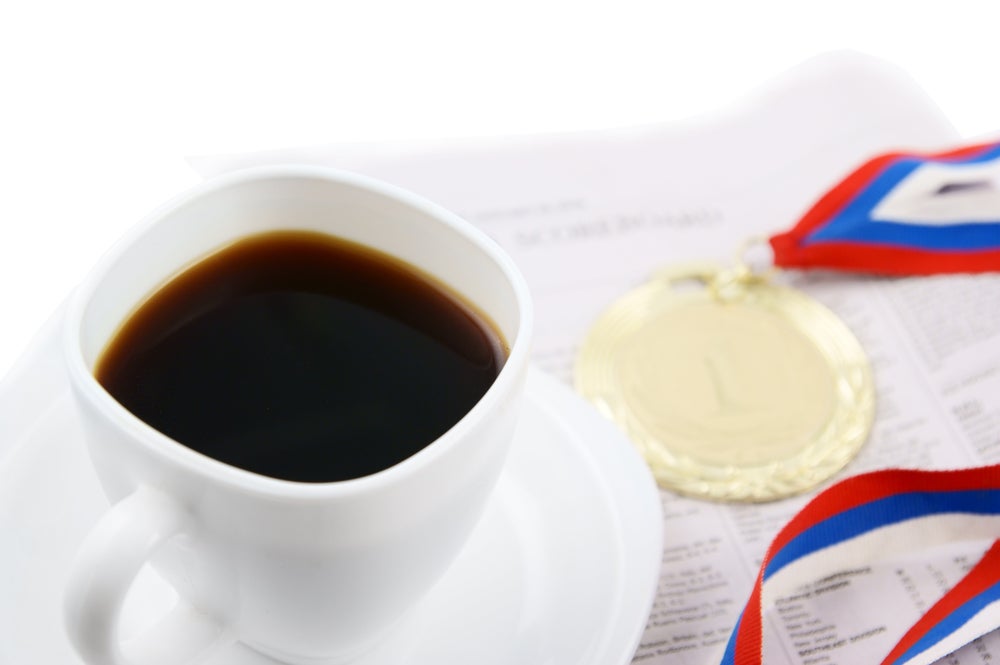Is Coffee Good Or Bad For Triathletes?

Photo: <a href=http://shutterstock.com>Shutterstock.com</a>
The debate about coffee’s effect on triathlon performance, and how it should be used, continues.
It was 6 a.m. on a Sunday morning and I lived in the top flat in a Victorian on Delmar Street in San Francisco. I looked out the window and saw before me a cold, clear day. I could see the “international orange” towers of the Golden Gate Bridge, a bridge I would run across to join some ultra-running buddies in the Marin Headlands. I returned to the kitchen. I was training for Wildflower and a long run was scheduled, three hours worth, and I carefully spooned an extra-strength dose of Peet’s coffee, ground like gunpowder, into the basket of my beloved Krups coffeemaker.
You may know the drill: the coffee is brewed and the senses pick up the aroma and the crackle of percolation, setting off a Pavlovian giddiness at the prospect of the first sip. Triathletes love coffee. Although Chrissie Wellington prefers her Darjeeling tea, most triathletes—Americans, Canadians, Australians and Germans in particular—rely upon coffee to get us through the overwrought hours of a dark pre-race morning.
It was the same for me on training days and especially on long training days. Like this one. And it was on this morning I realized the depth of my reliance on the brew, because as I moved across the kitchen with the steaming carafe, it some how slipped from my hand. Time slowed as I watched gravity take it from me and then of the course the explosion of coffee and glass. I was barefoot, so it was indeed odd that my first thought was not concern about slicing up my feet but rather I was a single despair: the coffee was gone and I had no other way to make any.
Over the years I keep an eye on the various studies on the consumption of caffeine. Is coffee good or bad for the endurance athlete? The conclusions tend to sea-saw. Coffee may dehydrate you, it may help you burn more fat, it may boost your psychological powers and increase performance, or it may overwork your nerves and decrease your performance.
RELATED: An Empowering Return To Coffee
So as things stand, here’s the deal: in terms of boosting athletic performance, coffee is apparently both good and bad for you. As explained in a recent article on Competitor.com by Steve Magness, an exercise scientist and former Oregon Project coach, coffee can stimulate both the central nervous system (CNS) and muscular contraction in a way that lifts performance up a notch. Sounds like good stuff, writes Magness, except for several specific costs exacted, when certain warning systems are bypassed: “The caffeine ingestion becomes the norm, and those safeguards that might tell you to back off for a certain workout are ignored or drowned out by drug-induced happiness to the body.” Pre-exercise coffee addiction may enable a state of chronic fatigue, Magness reasons, a risk that is also fueled by what Loughborough University researchers in the UK found out about combining caffeine ingestion and long bike rides in a 2010 study published in Medicine & Science in Sports, that antigen-stimulated T-cells are wiped out and the immune system takes a considerable hit.
So what’s a triathlete to do? Magness suggests a protocol similar to what three-time Ironman world champion Peter Reid experimented with in the final years of his career: stop drinking coffee so that when you do drink it on race morning it gives you powerful kick, in a one-time fashion that poses minimal dangers to your health. This was a painful addition of discipline for Reid, who was already living about the most monastic lifestyle one could imagine. And he loved coffee. Reid once admitted as such on his blog, writing, “Other than my new 42-inch plasma TV my favorite thing in my little home is my kick ass Saeco coffee machine.”
“Don’t use it for every workout,” Magness similarly advises. “Because in the end it doesn’t matter if you hit your mile repeats one second faster if the eventual drawback is some sort of chronic fatigue that comes back to bite you. Instead, save it for when it matters most: race day.”
So there it is for those wanting to shape their lives around optimal health and performance. For those of us unsure about whether such a ding is really all that important, the jury may still be out. Just don’t drop the coffee pot.
T.J. Murphy is the former editor-in-chief of Triathlete magazine and author of the book, “Inside the Box,” a book about his recent journey into CrossFit.
RELATED – Caffeine for Triathlon Performance: How Little Is Enough?
Get the latest in triathlon training, gear, nutrition and news sent straight to your inbox. Sign up for Triathlete’s newsletter.